|
|
|
Sort Order |
|
|
|
Items / Page
|
|
|
|
|
|
|
| Srl | Item |
| 1 |
ID:
072984
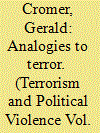

|
|
|
|
|
| Publication |
2006.
|
| Summary/Abstract |
Studies of the construction of social problems suggest that claims makers only relate to the issue that they are trying to place on the national agenda. However, an analysis of the Israeli public discourse about a number of social problems during the Intifada Al Aqsa indicates that this is not the case. The external threat served as an inferential structure for understanding and explaining the country's internal ones. Because of the centrality of the Intifada in the public imagination, claimants made a wide variety of analogies to the problem of Palestinian terror. All four areas of the discourse-about the severity of the problems, their causes, the rationales given for taking preventive and/or ameliorative action, and the solutions offered-were replete with references and analogies to the uprising. Clearly, the claimants believed that this was a particularly effective way of competing in the social problems marketplace, but the analogies may, in fact, have reinforced the existing hierarchy of priorities rather than lead to a significant shift in the public agenda.
|
|
|
|
|
|
|
|
|
|
|
|
|
|
|
|
| 2 |
ID:
072985
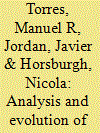

|
|
|
|
|
| Publication |
2006.
|
| Summary/Abstract |
The Global Jihadist Movement (GJM) has a series of well-defined objectives, which constitute the central points of their ideology. In the realization of these goals, propaganda and public communication play a central role. This article studies the evolution of the principal characteristics of GJM propaganda, analyzing over 2,000 documents issued by the GJM between 1996 and 2005.
|
|
|
|
|
|
|
|
|
|
|
|
|
|
|
|
| 3 |
ID:
072986
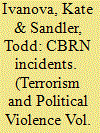

|
|
|
|
|
| Publication |
2006.
|
| Summary/Abstract |
This article investigates the relationship between regime characteristics and the likelihood of chemical, biological, radiological, and nuclear (CBRN) terrorist incidents. Odds ratios establish that democratic ideals-democratic rule, strong rule of law, and honest regimes-are associated with more CBRN incidents. Failed states may be where some terrorist groups form or take refuge, but these states have not been the venue of choice for CBRN incidents. Religious (cults and fundamentalists) and nationalist/separatist groups are not more likely than others to engage in CBRN attacks. To date, indiscriminate CBRN attacks are as likely as discriminate attacks to cause casualties. Transnational terrorist groups are less adept than others in concealing their acquisition of CBRN substances. For some regressions, democratic rule and strong rule of law are positive determinants of CBRN incidents.
|
|
|
|
|
|
|
|
|
|
|
|
|
|
|
|
| 4 |
ID:
072987
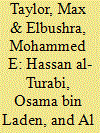

|
|
|
|
|
| Publication |
2006.
|
| Summary/Abstract |
This research note explores the events and circumstances surrounding Osama bin Laden's stay in Sudan from 1991 to 1996. In particular, it discusses the role that the Sudanese politician, Hassan al-Turabi may have played in the development of bin Laden and al Qaeda. It draws particular attention to the role of the Popular Arab and Islamic Congress (PAIC) in the emergence of a distinctive form of Radical Islam and offers a preliminary discussion of the emergence of particular qualities of al Qaeda ideology.
|
|
|
|
|
|
|
|
|
|
|
|
|
|
|
|
| 5 |
ID:
072983


|
|
|
|
|
| Publication |
2006.
|
| Summary/Abstract |
This analysis surveys Al Qaeda's employment of denial and deception (D&D) and shows that it uses D&D on tactical and operational levels in order to achieve strategic results. It defines denial and deception and explains how they relate to Al Qaeda, overviews Al Qaeda's changing network structure and seeks to summarize how Al Qaeda employs D&D throughout its operations. This paper is structured to show that denial and deception are institutionalized factors that manifest themselves through all aspects of bin Laden's organization and that the traditional conception of D&D-that nonstate actors are incapable of employing deception as an element of grand strategy-is incorrect.
|
|
|
|
|
|
|
|
|
|
|
|
|
|
|
|
| 6 |
ID:
072988
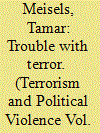

|
|
|
|
|
| Publication |
2006.
|
| Summary/Abstract |
This essay warns against a recent philosophical confusion concerning the definition of "terrorism," which has dominated the post 9/11 literature. Terrorism, it is suggested, is nothing but the intentional random murder of defenseless non-combatants, with the intent of instilling fear of mortal danger amidst a civilian population as a strategy designed to advance political ends. Furthermore, this essay argues that regardless of its "root cause," terrorism is diametrically opposed to the requirements of liberal morality and can only be defended at the expense of relinquishing the most basic of liberal commitments.
|
|
|
|
|
|
|
|
|
|
|
|
|
|
|
|
|
|
|
|
|